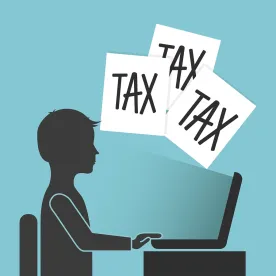In a unanimous decision written by Justice Neil Gorsuch (Rodriquez v. FDIC No 18-12690), the Supreme Court vacated a decision by the U.S. Court of Appeals for the Tenth Circuit (In re United Western Bancorp, Inc., 914 F. 3d 1262 (10th Cir, 2019)) that awarded a federal income tax refund of a failed bank to the Federal Deposit Insurance Corporation as receiver. The award was opposed by the Chapter 7 bankruptcy trustee for the holding company that owned the bank and had filed a consolidated federal tax return.
The Rodriguez case involved competing claims to a tax refund that arose as a result of a net operating loss incurred by the failed bank, that was carried back to a prior tax year on the consolidated return filed by the holding company. Looking beyond the specific tax issue before it, the Court focused on the limited scope of federal common law doctrines in general, as a basis to address the applicability of such doctrines to the competing rights of taxpayers to corporate tax refunds in particular.
Vacating the 10th Circuit decision and remanding the case to the lower court, the Court expressly invalidated the 47-year-old federal common law doctrine initially established in In re Bob Richards Chrysler-Plymouth Corp., 473 F. 2d 262 (9th Cir. 1973).
As applied in some other Circuit-level decisions and rejected in others, the Bob Richards doctrine established a “default rule” that in the absence of a clear and unambiguous agreement allocating or sharing a federal tax refund between or among members of a consolidated taxpayer group, the refund belongs to the entity that incurred the loss – in nearly all cases, the operating company and not the holding company.
The Court based its decision on well-established law that property rights, including interests in tax refunds owing to corporations created under state law, are governed by state law. The creation and application of federal common law to such matters is the exception and not the rule, and should be applied only where necessary to protect uniquely federal interests.
In the case of corporate tax refunds, the Supreme Court held that the federal government had no such interest in determining how a consolidated corporate tax refund, once paid to a designated agent of a consolidated group, is distributed among the consolidated group members. The decision notes that existing regulations already protect the federal interest of avoiding duplicate claims against the federal fisc for the delivery of a tax refund to a corporate group. 26 CFR 1.1502-77(d)(5). Finding no uniquely federal interest, the Court invalidated the “Bob Richards” rule and remanded the case to the lower courts to determine the issue of ownership under applicable state law, without regard to the federal common law “default rule” enunciated in Bob Richards.
While the decision leaves for the lower courts to decide the ownership of corporate tax refunds among members of consolidated groups, the issue is less likely to arise in the future since the Tax Cuts and Jobs Act of 2017 eliminated the ability to carry back net operating losses (NOLs) in order to generate refunds for taxes paid in prior years.
Nevertheless, NOLs can now be carried forward indefinitely and may shelter up to 80% of income earned in subsequent years. Therefore, the ownership of NOLs still may have significant economic value to a company on a going-forward basis, and their existence can still be a key asset for companies seeking to arrange exit financing in order to emerge from Chapter 11.




 />i
/>i

